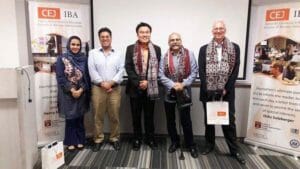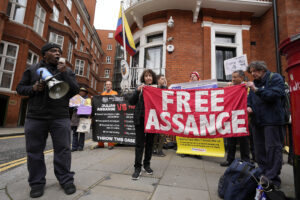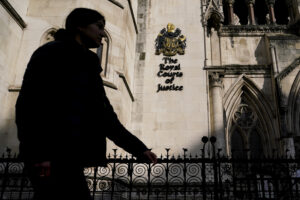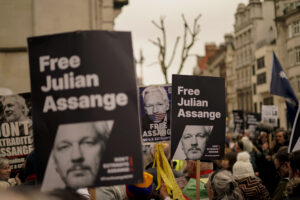Training Pakistani Reporters in an Uncertain Age
Reporters learn to improve their work standards—and to face the dire pressures put on Pakistan's media. Trainees attend a course on advanced news reporting in Karachi, Pakistan. (CEJ / IBA)
Trainees attend a course on advanced news reporting in Karachi, Pakistan. (CEJ / IBA)
 Photo Essay
Click here to view a photo essay for this story and related stories about Pakistani media.
Photo Essay
Click here to view a photo essay for this story and related stories about Pakistani media.
Truthdig is proud to present this article as part of its Global Voices: Truthdig Women Reporting, a series from a network of female correspondents around the world who have been hailed for their courage in pursuit of truth within their countries and elsewhere. Click here to read Chauhan’s related article about Pakistan’s media, and here for Zubeida Mustafa’s coverage, which the two journalists produced as a joint project for this series.
Media outlets have mushroomed in Pakistan during the past three decades, but the standards of reporting and editing have plummeted. Today, enterprising journalists are stepping up to improve the situation.
Pakistani television channels and radio stations proliferated when Gen. Pervez Musharraf allowed private entrepreneurs to enter the media scene in 2000. Print publications had experienced similar growth in 1988 when laws were amended to make it easier to launch a newspaper.
As a result, many who were not formally trained in journalism turned to the media for work. In the past, senior news staff had been available to mentor their younger colleagues, and apprentices or cub reporters picked up skills on the job. But with the boom in media outlets and subsequent lack of professional training and guidance, journalistic quality eroded.
Concerned professionals now are developing programs to raise media standards and to help journalists succeed amid the pressures facing Pakistani media.
A Platform for Change
The Centre for Excellence in Journalism (CEJ), launched in Karachi in 2016, offers internationally informed journalistic training, as well as counseling to support journalists in a country where voices of dissent are still often brutally silenced.
The center began as a partnership with the International Center for Journalists in Washington, D.C., and the Medill School of Journalism at Northwestern University in Chicago. Prior to 2014, Pakistani journalists who wanted training had traveled to America to receive it. “At some point, it was realized that Pakistan would benefit from an on-ground facility that would ensure long-term benefits cost effectively,” CEJ Director Kamal Siddiqi says.
CEJ’s training courses are taught by journalists with working experience in Pakistan’s media, along with lecturers from the Medill School and other foreign institutions. “It allows us to give our students world-class training,” Siddiqi says. The course subjects “are generally new to Pakistan and are tailored to our industry’s needs.”
CEJ courses also teach journalists to value the richness of diversity within their industry. Attendees hone their skills while interacting with colleagues from many different cities and environments. Back at work, this can pay dividends by helping bridge the gap between subeditors working at the news desk in big cities and reporters filing stories from rural areas.
In addition to shorter courses, the center offers a program in which students receive a master’s degree in journalism.
While trying to produce skilled journalists, CEJ is mindful of the pressures that come with working in Pakistan’s media. In collaboration with Deutsche-Welle Akademie, a German organization promoting international media development, the center has established free counseling services for Pakistani journalists. Pakistan is one of the “most dangerous” countries for journalists, according to the World Press Freedom Index. In this volatile environment, reporters risk attacks, kidnapping and even death. Perpetrators range from gangs and militant organizations to law enforcement agencies. “Though not one of its core activities, the [counseling] service is a spinoff from CEJ’s work with … journalists all over Pakistan,” Siddiqi says.
Campus Radio Stations
Along with other media outlets, university radio stations are expanding in Pakistan, with 45 operating today. Universities that teach media studies and mass communication begin their own FM stations to broaden their students’ learning experience.
One example is Ziauddin University’s FM station 98.2, launched in 2011. The university, in Karachi, aims at grooming students for the field of radio by introducing new trends in broadcasting. FM 98.2 produces a range of programs based on assignments given to students, including interviews, radiomentries (radio documentaries), music, lectures and coverage of campus activities. “Student participation not only helps them in their academics but also prepares them to face the challenges of the practical field,” says Ajnabi (who goes by this name alone), a visiting faculty member at the university.
Working at the station benefits students by “equipping them with professional knowledge for marketable programming as well as technical information that is required for sound quality transmission,” Ajnabi says. “Moreover, the campus radio has kept up with new creative ideas and technology. For instance, social media networks such as Whatsapp, Twitter and Instagram are also being used in different shows, [which is needed in] today’s communication world.”
Students learn to produce creative, out-of-the-box content ideas within parameters, including the guidelines set by PEMRA (the Pakistan Electronic Media Regulatory Authority). For instance, one restriction prohibits campus radios from airing any commercial or paid material.
So far, university radio has steered clear of external pressures that commercial media outlets face in Pakistan. But with growing restrictions on the voice of dissent even in universities, we can only wonder how long this freedom will last.
Your support matters…Independent journalism is under threat and overshadowed by heavily funded mainstream media.
You can help level the playing field. Become a member.
Your tax-deductible contribution keeps us digging beneath the headlines to give you thought-provoking, investigative reporting and analysis that unearths what's really happening- without compromise.
Give today to support our courageous, independent journalists.









You need to be a supporter to comment.
There are currently no responses to this article.
Be the first to respond.